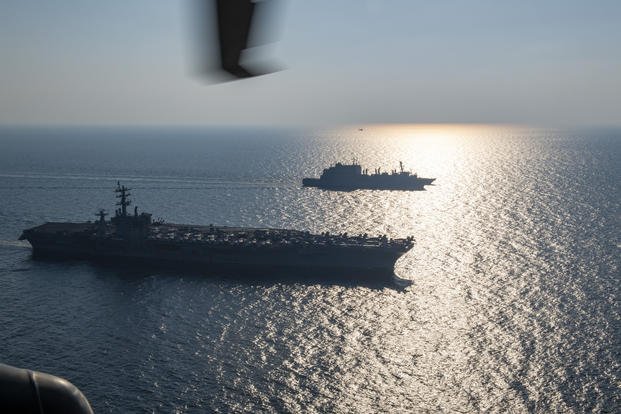The U.S. military and its allies on Thursday conducted major retaliatory strikes in Yemen hitting multiple Houthi targets after several months of drone and missile attacks by the Iranian-backed rebels that have menaced merchant shipping in the Red Sea.
A senior military official told reporters late Thursday evening that the U.S. and U.K. conducted strikes that were launched from aircraft, ships and submarines, destroying multiple targets in Houthi-controlled areas of Yemen. Defense Secretary Lloyd Austin said the operation was carried out with support from Australia, Bahrain, Canada and the Netherlands.
The Navy has deployed the USS Dwight D. Eisenhower aircraft carrier as well as several destroyers to the area in recent months. The Navy also released pictures of a Tomahawk cruise missile-armed submarine heading to the Red Sea in early November.
The military official noted that the military used "precision-guided munitions" but would not offer more details. The Associated Press reported that witnesses heard explosions in Yemen's capital Sanaa and Hodieda, the largest port city in Yemen controlled by the Houthis.
A senior administration official who was also on the call with reporters said the attacks were focused specifically on Houthi missile, radar and drone capabilities -- "the capabilities that are essential to the Houthis' campaign against commercial shipping in international waters."
In a social media post, a British member of Parliament said that four Royal Air Force Typhoon fighter jets conducted precision strikes on two Houthi military targets alongside U.S. forces.
The strikes come after months of missile and drone launches by the Houthis that were largely intercepted and downed by U.S. warships deployed to the area. The first incident was on Oct. 19 when the destroyer USS Carney downed four missiles and 15 drones. Since then, the attacks have continued and escalated, and officials say that since Nov. 9 there have been 27 attacks aimed at international shipping.
"Today's coalition action sends a clear message to the Houthis that they will bear further costs if they do not end their illegal attacks," Austin said in a statement Thursday evening.
The senior administration official who briefed reporters said that the military strike was "a significant action and conducted with every objective and every expectation that will degrade in a significant way the Houthis' capability to launch exactly the sorts of attacks that they have conducted over the period of recent weeks."
The military official wouldn't offer a specific assessment of the strikes, saying "those specifics will be forthcoming."
In early December, the Houthis said that their goal was to "prevent Israeli ships from navigating the Red Sea and [Gulf of Aden] until the Israeli aggression against our steadfast brothers in the Gaza Strip stops." Israel declared war on Hamas, which ruled the Gaza Strip, after it launched a sudden and deadly terrorist attack into Israeli territory in early October.
However, many of the Houthis' more recent strikes have had no connection to the brutal war in Gaza and instead imperiled international shipping and forced shipping companies to divert cargo out of the Red Sea. The senior administration official said the Houthis are "firing indiscriminately."
"Reckless attacks have directly affected the citizens and cargo and commercial interests of more than 50 countries," the official said.
In a Dec. 31 incident, four Houthi boats tried to seize a merchant vessel. When U.S. helicopters responded to the ship's distress call, the boats opened fire on the helicopters. The aircraft returned fire, sinking three of the boats and killing the crews.
The senior administration official said that attack accelerated plans and led President Joe Biden to direct his advisers to "further develop military options."
Last week, the White House, along with the U.K. and 12 other countries, released a joint statement that warned the Houthi rebels that they would "bear the responsibility of the consequences should they continue to threaten lives, the global economy, and free flow of commerce in the region's critical waterways."
Despite the warning, one of the most complex attacks occurred on Tuesday when, according to U.S. Central Command, the Houthis launched 18 drones, two anti-ship cruise missiles and one anti-ship ballistic missile that were shot down by a combined effort of F/A-18s from the Eisenhower and the destroyers USS Gravely, USS Laboon and USS Mason, as well as the U.K.'s HMS Diamond.
The senior administration official said that this attack directly targeted a U.S. commercial vessel and, after it was defeated, the president again convened his national security team and ordered the strikes that occurred Thursday.
Early reactions to the strikes on Houthi targets in Yemen were lukewarm, with some, including congressional Republicans, noting that they should have come sooner.
Sen. Roger Wicker, R-Miss., called the strikes "two months overdue" in a statement posted to social media.
Meanwhile, both Rep. Ro Khanna, D-Calif., and Rep. Thomas Massie, R-Ky., criticized Biden for not coming to Congress for permission to conduct the strike.
The senior military official warned that the Pentagon "would not be surprised to see some sort of response."













